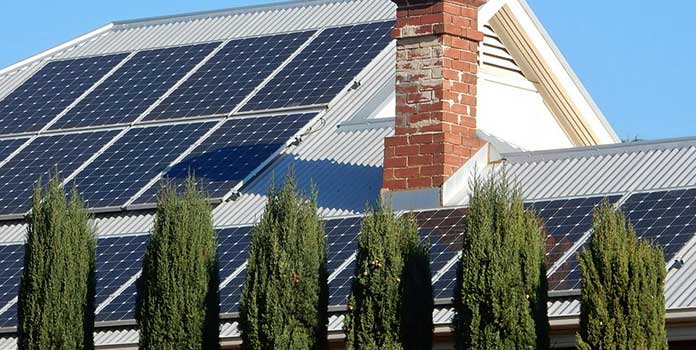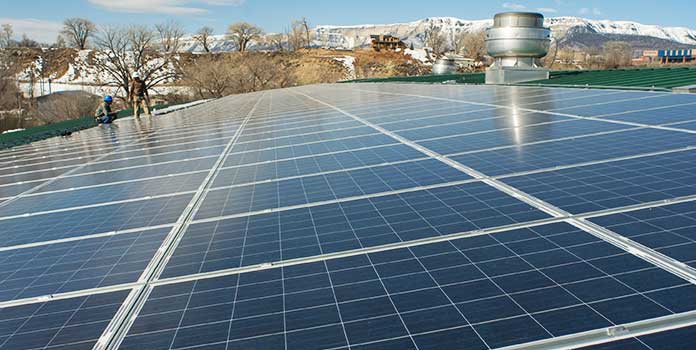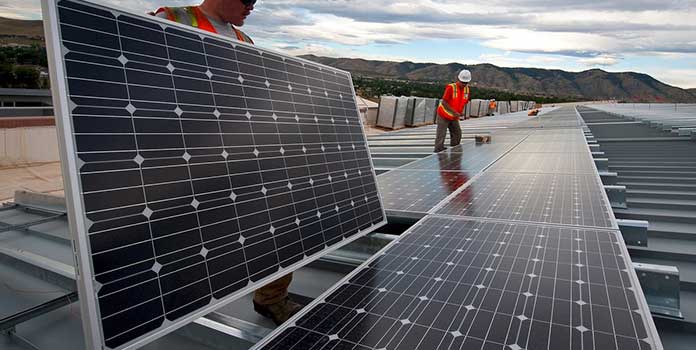Most Efficient Solar Panels

Should you install the most efficient solar panels for your home?
It’s a good question. You’re putting down a lot of money up front to install these panels, so you want to get your money’s worth. Higher efficiency means more energy, which means greater savings, right?
As of 2018, the most efficient solar panels are all around 20 to 22% efficient. Here’s the top 3 most efficient solar panels currently on the residential market:
- Sunpower X-Series: 22.8% efficiency
- LG NeON R: 21.1%
- Panasonic HIT+ Series: 20%
While buying the most efficient panels available might seem like a great idea, you’d be surprised to find that, most of the time, buying the most efficient – aka expensive – panels isn’t worth it financially. Let’s dive in to see why!
What Is Solar Panel Efficiency?
Residential solar panels are composed of 60 solar cells linked together. These cells are what actually convert the sunlight into electricity. When sunlight hits the panels, the light’s energy is captured and converted to electric energy that you can use to power your home.
Solar panel efficiency is simply the percentage of sunlight that hits the solar panel that is converted into electricity. Solar panels aren’t terribly efficient, so most of that sunlight simply bounces off the panel or is wasted.
In the solar industry, we generally split solar panels into ‘standard efficiency’ and ‘high efficiency’ panels. Most solar panels we install on our homes are ‘standard efficiency’ and typically are around 18% efficient. ‘High efficiency’ or premium panels bump that efficiency up to 20% to 22%.
That probably doesn’t sound like a big difference, but when you do the math (22% divided by 18%), you realize that a panel with 22% efficiency actually produces 22% more electricity than an 18% efficient panel, not 4% more like most of us probably think initially.
So you certainly enjoy more electricity from these premium, high-efficiency panels, but the danger is that, when you look at your bank account, the high cost of these panels can negate that efficiency increase.
What Are The Most Efficient Solar Panels?

As of 2018, the most efficient solar panels are:
- Sunpower X-Series: 22.8% efficiency
- LG NeON R: 21.1%
- Panasonic Hit+ Series: 20%
Let’s take a quick look at each company’s offerings.
Sunpower X Series
Sunpower manufacturers the world’s most efficient residential solar panel. Their X-Series residential panels are 22.8% efficient and Sunpower claims they produce 45% more electricity their first year when compared to conventional panels. Sunpower panels are also the most durable panels on the market, with full 25 year product and production guarantees – one of the best in the entire solar industry.
LG NeON R Panels
You probably are already familiar with Korean manufacturer LG thanks to their popular phones and TVs. However, they also make some of the most efficient solar panels for homes on the market today. At 21.1%, their NeON R panels are extremely efficient and enjoy the same warranties as the Sunpower panels above, namely 25 year product and production guarantees.
Panasonic HIT+ Series Panels
Lastly, Panasonic’s Hit+ solar panels – specifically the N335 model – enjoys 20% efficiency as well as 25 year product and production guarantees, just like the previous two. While this panel is noticeably less efficient than either of the two above, compared to almost all other residential solar panels on the market today, Panasonic’s HIT+ series is actually quite incredible!
Before settling on any solar panel, our best advice is to talk with a local solar installer to get a true professional’s opinion. They can tell you whether any of the panels above make sense for your roof, and if the additional power output produced by these expensive panels are really going to pay off.
How Expensive Are the Most Efficient Solar Panels?
Expect to pay a premium for high efficiency solar panels. We looked into the cost of Sunpower solar panels previously and found you’ll likely pay around 1.5 to 2x more than standard solar panels. For the average solar installation, that means you can tack on additional $3k or so for the most efficient solar panels for your home.
With this high cost you’re also getting additional benefits. The most efficient solar panels are always top-of-the-line products and these premium panels are built to last, with extra-strong components and extremely long-term warranties. Whether or not these additional benefits are important to you to justify spending that extra money is up to you.
Benefits of High Efficiency Panels
Of course, beyond the great warranty and high durability, high efficiency solar panels do offer other benefits over standard panels. First, since they produce more electricity per panel, you can actually install fewer panels on your roof, helping you to shave some costs.
For example, if you want to install a 6,000 watt solar installation on your roof, you can get away with installing a few less high efficiency panels. Here’s a rough example of what you might find:
- High efficiency panels (310w panels): 20 panels total
- Standard efficiency panels (270w panels): 23 panels total
And since you don’t need to install as many, high efficiency panels are perfect when your roof space is restricted and you only have a small area to work with.
However even with these benefits, many homeowners find that the higher energy production of premium solar panels still doesn’t justify the cost. In the end, most simply install fewer standard solar panels and deal with the slightly lower energy production.
Focus on Value, Not Efficiency

Installing solar on your roof is a financial investment. The whole point is to help save you money. So don’t focus in on finding the most efficient solar panels available. Instead, focus on finding the most cost-effective solar panels – the best value for your money.
Sure, you could buy premium, high efficiency panels, but spending an additional $3k on your solar installation just means you’ll be waiting a few more years to see a return on your investment and that your overall financial savings will be $3k lower.
Of course, you may be concerned the cheaper panels will be less effective. In a sense, that’s true. They’re less efficient, so they produce less electricity. Again though, when looking at solar panels, don’t focus on efficiency. Instead, focus on value. You want the most cost-effective option.
An easy way to compare the value of solar panels of varying wattages and cost is to compare their $ per watt cost. Let’s say you’re looking at two different solar panels, a high efficiency option and a standard efficiency option. Let’s compare their $/watt cost:
- High efficiency panel that is 310 watts and cost $352 = $1.13 per watt
- Standard efficiency panel that is 270 watts and $175 = $0.65 per watt
See how easy it is to compare prices now? With some simple math, you can easily see that the high efficiency solar panels cost 175% more than the standard panels.
Looking for Efficient Solar Panels
Poking around online to see what’s available is all well and good, but it’s only so helpful. Panel prices can vary wildly in online stores and panel selections come and go very quickly.
More than likely, you won’t even be buying your own solar panels directly. Instead, your solar installer will provide them for you. While this does limit your options somewhat, it also can secure you a much better price, as they can buy in bulk and secure discount pricing.
Installers typically have two or three panel options for customers to choose from, including one or two standard efficiency panels and at least one high efficiency option.
If you’re looking to install the most efficient solar panels (or just solar period), the first step is to reach out to a few local installers and see what they have. They’ll know what’s available in your local market and also have a few recommendations on which products are best suited to your area.
Should You Wait for Higher Efficiency Panels Before Going Solar?
The short answer: No!
The idea that current technology isn’t efficient enough may stem from the news bombarding us with stories about some new solar cell that exceeded 40% efficiency. Unfortunately this kind of news can lull people into thinking we’re due for a new breakthrough, and that it’s better to wait rather than go solar today.
The last 80 years of solar history is marked with rare, minute increases in panel efficiency. In 1960, manufacturer Hoffman Electronics created a 14% efficient solar cell. Sixty years later, after non-stop, painstaking research and development, we’re not that much further along – which goes to show just how hard it is to increase solar cell efficiency. So if you’re holding out for a huge jump in efficiency, you’ll be waiting a long time!
On top of that, energy costs are rising too. So while you’re waiting for that perfect solar panel, you could instead be saving money with our ‘inferior’ products we have today.
Talk to Your Installer For More Info on Panel Efficiency
As manufacturers continually research and development new technologies, solar panel efficiency continues to creep upward. Today, we’re blessed with some truly efficient solar panels:
- Sunpower X-Series: 22.8% efficiency
- LG NeON R: 21.1%
- Panasonic HIT+ Series: 20%
If you’re looking to purchase a solar installation for your home or business, the best course of action is always to discuss your options with a local solar installer or two (or three). They’ll let you know which of the most efficient solar panels are currently available in your area, as well as the pros and cons to each of the different solar panels they carry.
